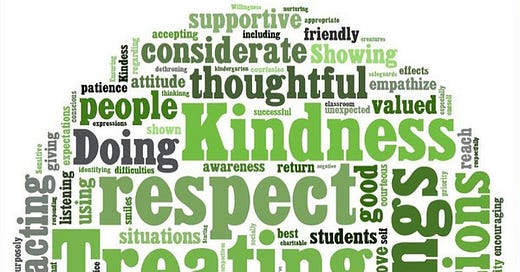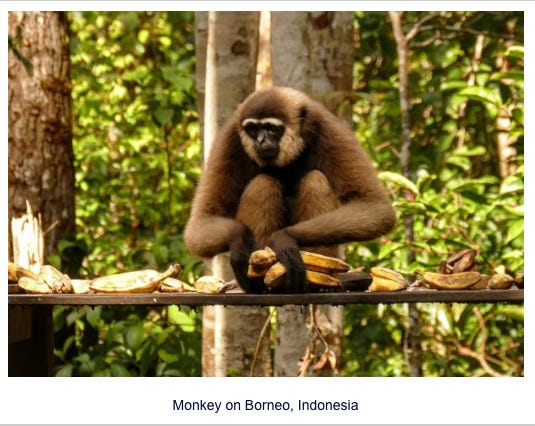Mensch•Mark For Elul 2: Loving All Creatures - Ohev et HaBriyot
Here’s where Judaism stands shoulder to shoulder with JD Vance’s "cat ladies." We should love our neighbors, human, feline and otherwise, and preserve and protect endangered species.
Loving All Creatures - Middah Ohev et HaBriyot
URJ’s Take:
The rabbinic sage Hillel admired Aaron, the brother of Moses, as someone who had many good traits. Among those traits mentioned in our Text is loving one's fellow creatures (Ohev et HaBriyot).
In a commentary on Pirkei Avot, the rabbis use two familiar stories from the Bible to emphasize the importance of loving others.
"People must love their fellow creatures, and not hate them. The people of the generation which was dispersed over the earth (the tower of Babel generation, Genesis 11:1-9) loved one another, and so God did not destroy them, but only scattered them. But the people of Sodom hated one another, and so God destroyed them from this world and from the world to come." (Avot de Rabbi Natan 12, 26b)
In order to understand what it means to love all creatures, Rabbi Susan Freeman suggests that we turn to two respected sages, Maimonides and Rabbi Abraham Isaac Kook. To Maimonides, it is how we behave toward others that shows our love for them. He explains that the commandment to "love your fellow person as yourself" is the basis for carrying out specific deeds of loving kindness such as visiting the sick, comforting mourners, and caring for the dead.
Rav Kook agrees with Maimonides and says that love for others is to be "expressed in practical action, by pursuing the welfare of those we are bidden to love, and to seek their advancement." (Teaching Jewish Virtues, p.179)
What about people who are different from us - people who are physically or mentally challenged; people who speak another language or whose skin is another color; people who may make us feel uncomfortable-are we supposed to love them too? Perhaps one of the reasons we have a virtue (middah) that instructs us to love all creatures (Ohev et HaBriyot) is that it's not something that we can do easily. Studying and thinking about the middah helps us to become more aware of its importance. (Teaching Jewish Virtues p.184)
Surely the middah (virtue) of Ohev et HaBriyot (loving all creatures) must embrace all the creatures God created, including animals, birds, and insects. A Hasidic source teaches that we must never speak derogatorily of any creature of God. Rabbi Susan Freeman suggests that we turn that comment into the positive, ie. speak positively of every creature of God, whether cow, wild animal, or bird. In fact, if you have ever had a pet, you know that you can feel love for an animal.MARLENE MYERSON
My Take #1: “Choose Life,” for all creatures - and species.
James Herriot wrote in All Creatures Great and Small:
If having a soul means being able to feel love and loyalty and gratitude, then animals are better off than a lot of humans.
Judaism has a rich tradition emphasizing kindness to animals, a mitzvah known in Hebrew as “Tza'ar ba'alay chayim," literally "feeling the pain of living things." We should feel their pain - and we can be inspired by them too.
We read in Deuteronomy 22:6:
If, along the road, you chance upon a bird's nest, in any tree or on the ground, with fledglings or eggs and the mother sitting over the fledglings or on the eggs, do not take the mother together with her young. Let the mother go, and take only the young, in order that you may fare well and have a long life.
In Midrash Tanhuma, we read that Rabbi Shimon bar Yohai taught:
The Holy One has revealed the reward for heeding two precepts in the Torah: one of these precepts is the least onerous, and the other is the most onerous. The least onerous concerns letting the mother go when chancing on a bird's nest - with regard to it, the Torah promises, "that you may have a long life." The most onerous concerns honoring one's father and mother - with regard to it, also, the Torah promises, "that your days may be long."
This midrash is teaching us that all the mitzvot are equal, from sending away the mother bird - which is spontaneous and easy, involving no expense or preparation - to honoring one's parents - which may require extraordinary effort and significant financial and emotional investment.
It also calls attention to the two texts, and when you compare them, there's a fascinating discrepancy. In the Ten Commandments, the Torah says, "Honor your father and your mother in order that your days - yamekha - may be prolonged." However, in Deuteronomy 22, the text says, "Let the mother bird go . . . in order that you may fare well and have a long life (literally, prolonged days - yamim)."
While the plain meaning of the second text is that by fulfilling this mitzvah you will prolong your life, that's not what the verse actually is telling us. It says, "so that you will prolong (all) life." Perhaps the commandment to send away the mother bird is not about preserving the life of the person who finds the nest, but about preventing the destruction of all species, great and small.
Ramban (Nachmanides), the 13th century Spanish commentator, hints at this. He writes, "The Torah will not permit a destructive act that would uproot a species even though it does permit the ritual slaughter of members of that species." In other words, if people routinely took mother birds along with their nests, in time there would be no more nests and no more birds.
If this concerned Ramban in the 13th century, how much more should we be concerned today, when we know of thousands of extinct or endangered species.
See another take on the mitzvah to shoo away the mother bird, and an incident that happened to me involving lion cubs in Africa.
Why should we worry about the possible extinction of plant and animal species when so many human beings around the world are in desperate need?
Some would argue that it's a matter of enlightened self-interest - perhaps we'll destroy a plant that might be used to cure cancer or an animal whose DNA might one day protect us against Alzheimer's disease. But the Torah teaches us that there is more to life than self-interest. At the very beginning of the Genesis, we read:
"And God said, let us make the human being in Our image, after Our likeness. They shall rule the fish of the sea, the birds of the sky, the cattle, the whole earth, and all the creeping things that creep on earth."
After God does so, the Torah says, "The Lord God took the human being and placed them in the garden of Eden, to till it and tend it."
As the Psalmist proclaims, "The world and everything in it belongs to God." We human beings didn't create it - and we have no right to destroy what we did not make.
God gave human beings the specific task of tending, guarding, and preserving the world. So we can take the nest, but we should chase the mother bird away to ensure that the world will always be full of birds. When the Torah exhorts us "u'v'harta b'hayyim," (Choose life), there are no limits placed on the forms of life we celebrate.
You can read more about Judaism and pets in this article.
So yes, JD, pets are good - and the binary choice of kids vs, cats, the zero sum game of whether to have pets or children, is a false one. And for those who choose the pets-only path, or who have that choice imposed on them via physical, social or economic reasons, if they have pets, or even if they are simply kind to animals that aren’t theirs, they are still fulfilling the mitzvah of the mother bird.
See my book, Menschmarks: Life Lessons of a Human Rabbi
My Take #2: Animal Cruelty and Jewish Law
This question was taken from a series I did for the NY Jewish Week, Hammerman on Ethics.
Q: This may sound weird, but I think my neighbor is cruel to his pet beagle. I know that if this was a person we were talking about, Jewish law would obligate me to go to the authorities. But this is a DOG. What's my obligation here?
A. You need to pursue this. I say this not merely because I am life-long pet-o-phile, a vegetarian with two cuddly standard poodles. I say this also because it is the right thing to do. Jewish culture has long championed animal rights.
The Torah could not be more explicit when it instructs us (Exodus 23:5) to assist the animal of your enemy.
In that verse, the animal is a donkey that has been mistreated, presumably by its owner. Based on this law, the rabbis established the concept of "tza'ar ba'ale hayyim," calling on us to minimize the suffering of all living creatures, literally to "feel their pain" in a Bill Clinton sort of way.
Jews have a long history of opposing such activities as hunting for sport or cockfighting. The Talmud goes as far as to state that even the person who sits in the stadium to watch this kind of event spills blood. We should refrain from eating until we've fed our animals and we are not permitted to buy cattle beasts or birds unless we can adequately care for them.
Animals even get to observe Shabbat, during which we are prohibited from placing any burden at all on them. A full chapter of the Shulchan Aruch deals with this. A nice summary of the Jewish view on animal rights can be found here.
The ASPCA web site details how to determine if abuse is really taking place and what you need to do about it. The Michael Vick case has sensitized us all to the need for vigilance against animal abuse, and the first line of defense is the neighbors. The Humane Society of the United States even has a dog fighting tip line - although it likely won't be relevant with a pet beagle. American Jews have had an animal rights scandal all our own, the inhumane conditions discovered at the now-bankrupt Agriprocessors plant.
Western society has come a long way in its sensitivity toward animals (in Elizabethan England, for instance, bloody dog fights were ubiquitous), but we've a long way to go.
So if your suspicions are well grounded, you've got to do something.
My Take #3 - A photo essay of our neighbors
Below are some photos I took in Israel and Southeast Asia, where in 2018 I had the chance to interact with God's creatures, great and small, living in their habitat. We got up-close to elephants and tigers in Thailand, ibex and hyrax in Israel and monkeys and orangutan in Indonesia. Click here for the full "Creatures Great and Small" album.







